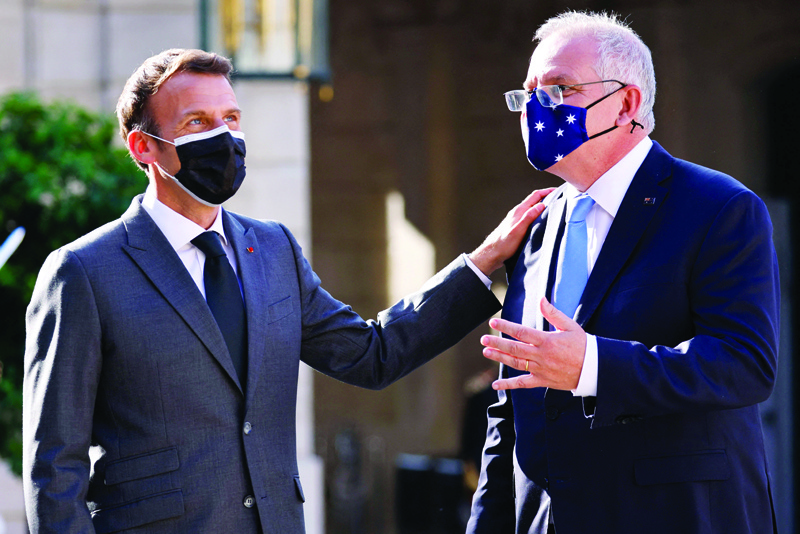 PARIS: File photo shows French President Emmanuel Macron greets Australia's Prime Minister Scott Morrison at the Elysee Palace in Paris. French President Emmanuel Macron spoke with Australian Prime Minister Scott Morrison by telephone yesterday for the first time since the diplomatic crisis over a scrapped submarine deal last month. - AFP
PARIS: File photo shows French President Emmanuel Macron greets Australia's Prime Minister Scott Morrison at the Elysee Palace in Paris. French President Emmanuel Macron spoke with Australian Prime Minister Scott Morrison by telephone yesterday for the first time since the diplomatic crisis over a scrapped submarine deal last month. - AFP
PARIS: French President Emmanuel Macron spoke with Australian Prime Minister Scott Morrison by telephone yesterday for the first time since the diplomatic crisis over a scrapped submarine deal last month, the Elysee Palace said. Macron reiterated that Canberra's decision to cancel a deal for conventional-powered French subs in favour of US nuclear vessels "had broken the relation of trust between our two countries," his office said in a statement.
"It is now up to the Australian government to propose concrete actions that could embody the will of Australian authorities to redefine the bases of our relationship and pursue joint action in the Indo-Pacific region," it said.
Paris was furious after Australia ditched the deal last month, saying it had been given no warning that Australia was instead negotiating a new defence pact with the US and Britain.
Australia had signed a contract in 2016 to buy the French subs, a deal worth Aus$50 billion (31 billion euros, $36.5 billion) when signed. France recalled its ambassadors to Australia and the US in protest, with Foreign Minister Jean-Yves Le Drian denouncing "a stab in the back". Paris is also insisting on financial compensation. "Close attention will now be paid regarding the situation for the French companies and their sub-contractors, including Australian firms, impacted by this decision," the Elysee statement said.
Meanwhile, Australia's conservative government yesterday proposed laws requiring voters to prove their identity when casting a ballot, a move slammed by the opposition as an attempt at voter suppression and to mimic the policies of former US president Donald Trump. Ahead of upcoming national elections due by May next year, the government introduced the "voter integrity" bill to the House of Representatives, saying it would prevent potential fraud and multiple voting.
The legislation would require voters to show a proof of identity document -- such as a photo ID, birth certificate, credit card or bank statement -- at polling booths on election day. Voting is compulsory for Australians aged over-18. Voters simply provide their name and address to a polling station worker before casting their ballot. Opposition leader Anthony Albanese of the centre-left Labor Party said the government was trying to "channel the US far right" by attempting to introduce voter suppression measures before the upcoming election.
"This is a desperate attempt to undermine our strong democracy and deny Australians their basic democratic rights," he told parliament. "The Morrison-Joyce government is trying to bring the politics and tactics of Trump's America into Australian democracy." Prime Minister Scott Morrison defended the legislation, saying it was a "standard practise that is in liberal democracies" around the world. "It's not an earth-shattering proposal that when you go to the vote that you should be able to say you are who you are and provide some form of identification to support that, that's an important protection for our democracy," he told reporters in Canberra.
According to the Australian Electoral Commission, the independent body that oversees elections, voter fraud is a "vanishingly small" issue in the country.
There were no prosecutions for multiple voting arising from the last election, the opposition said. Voter ID laws are common across western democracies, but efforts by conservatives to introduce them in the United States have sparked controversy, with opponents arguing they discriminate against voters from minority backgrounds by requiring the purchase of a proof of identity.
Under the Australian government's proposed laws, voters who could not produce an ID would still be allowed to cast a "declaration vote", which involves signing a detailed document asserting their claim to vote in an electorate. But critics say that form is complex and could present difficulties for people from non-English speaking backgrounds. - AFP




